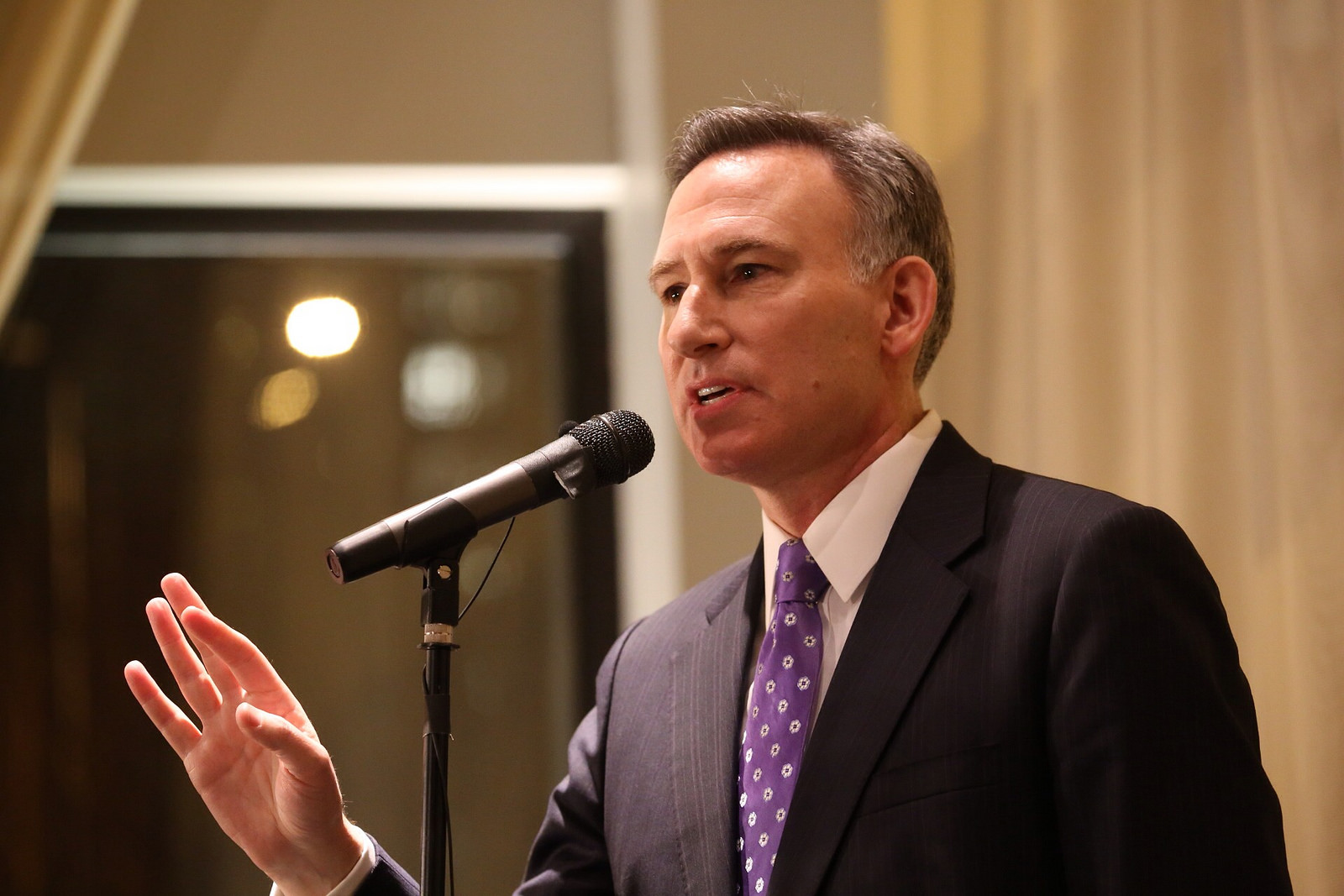Connecting state and local government leaders
In the first of a multi-part guest article series for Route Fifty, King County Executive Dow Constantine examines a complex issue many public officials around the United States are facing in their communities: income inequality.
King County is Washington state’s most populous jurisdiction and home to more than 2 million residents. The city of Seattle and many of its suburbs fall within its roughly 2,000 square miles. It’s also a living laboratory for government operations, public services and ways to address complex policy issues common to urbanized areas.
Dow Constantine, a West Seattle native, former Washington state senator and former member of the King County Council, was elected county executive in 2009 and has made smart management and performance a cornerstone of his administration.
In a multi-part guest article series, “Connected Government,” Constantine will explore important issues that the King County government has been facing, issues common to many local jurisdictions around the United States.
Constantine kicks off the “Connected Government” series with an examination of income inequality.

King County Executive Dow Constantine (Photo courtesy King County Government)
An Introduction: Partners With the People
If you think about it, the history of the United States is marked by events that have moved us toward fulfilling the promise of a connected government. From Boston Harbor to Ferguson, Americans have fought for inclusion and the realization of the elusive democratic ideal announced at our nation's birth.
Of course, in the 21st century we have many more ways for government to connect with the needs of the people—not just wired in with cold, efficient technology, although technology can be a great democratizing force.
In fact, the greatest advances in connecting citizens with their government can come through innovative practices, strengthening human relationships and deepening real communication between we the people and the people we employ, entrust and empower to meet our community needs.
Our national heritage supports this idea. The Founding Fathers believed that government should help individuals do the things they cannot do on their own. Jefferson's Declaration of Independence asserts that people institute government to secure their rights, and that they do so "laying its foundation on such principles and organizing its powers in such form, as to them shall seem most likely to effect their Safety and Happiness." In our darkest hour, Lincoln called on us to preserve government of, by, and for the people. Whatever our pretentions of rugged individualism, we have created government to do for us collectively what we are unable to do acting individually.
Much of the rancor in American politics has been around the appropriate scope of this collective work. We can't seem to agree on what our common enterprises should be—people may be fairly unified when it comes to national defense, public safety and road building; yet there is considerable debate about the appropriate public role in securing affordable housing, universal health care or social equity.
Healthy debate helps us hammer out better solutions for people. Increasingly, however, divergent and rigid views about what government can—and should—do seem to dominate the political conversation. This discord makes it more difficult for government institutions and public officials to stay connected with the community.

(Photo by Silvio Ligutti / Shutterstock.com)
As King County Executive in Seattle, I have embraced several common-sense principles in order to connect government to the people, whatever their experience or expectations. Some of this is simply finding new avenues to increase my engagement with the two million residents I was elected to serve. But there is also the creation of common ground: The drive to become the best-run government. This has struck a chord across the political spectrum because, while we may disagree about the role of government, everyone in our community wants their government to be efficient, effective, innovative and continuously improving.
That's why I'm daily looking for better answers; and, in that quest, our greatest resource is the wisdom and creativity of front-line public employees and the people they serve.
Keeping that in mind, here are several of the core values that, from my perspective, help support and sustain connected government:
- Delivering excellent customer service
- Data-driven decision making
- Removing barriers to success
- Building partnerships - with community, governments, businesses and our employees
- Equity and social justice that creates opportunity
- Ensuring financial sustainability
In the following article, I'll discuss how some of these values are helping me address the issue of income inequality.
And, in the coming weeks, I'll be writing about staying connected with the people in these important areas:
- Investing in the Arc of Child's Life
- Affordable Health Care
- Lean Management
- Investing in Infrastructure
- Confronting Climate Change
- Mobility to Ensure Economic Prosperity
- Connecting Veterans with Services
- Budget Efficiency
- Transforming Juvenile Justice
As a public official, I believe that I must keep partnering with the people who elected me if we are to draw our community closer to the American dream—the ideal that each person will have the genuine opportunity to flourish based on talent and initiative.

Alki Beach in West Seattle (Photo by George Cole / Shutterstock.com)
Income Inequality: A Background Briefing
Inequality of income has forced its way into the public policy arena, and I believe we're now at an inflection point where it's threatening our national economic growth in addition to our social fabric.
It's axiomatic that economic growth is driven by a strong middle class. But in King County, where I live, 95 percent of the net new households created since 2000 earn either less than $35,000 a year, or more than $125,000. One can quibble over the definition of middle class, but the dearth of new households earning anywhere near the 2013 median income of $72,000 is troubling.
This economic sinkhole in the center wasn't in evidence when I was growing up in West Seattle. Back then, it seemed as though the majority of the parents worked at Boeing, or the port or the steel mill. There was a large working and middle class; a comfortable quality of life with plenty of access to the common goods of the mountains and Puget Sound; and few signs of either great wealth or great poverty.
But the evaporation of new middle-class families today is feeding a vicious cycle of less-robust consumer spending, lower government revenues and reduced investment in the infrastructure and education needed for future growth and opportunity.
It's important to note that this income inequality is a long-festering issue that has its roots in national and international macroeconomic and social trends and policies—liberalization of trade and finance; the technological revolution; the decline in the power of labor unions; significant shifts in national tax policy; and decline in investment in education and infrastructure, to name just a few.
As a result, it's unrealistic to think that local government on its own can reverse the tide of income inequality. But this is an issue where a city or a county can engage and involve the community in a meaningful way, understand in human terms what this means for families—both today and tomorrow—and then truly connect with people to start changing the equation.
My core commitment has been to create the conditions where each person can have a fair shot at success—regardless of race or wealth or neighborhood. And by fair shot I don't mean a long shot.
By determinedly considering the equity implications of every decision, policy, practice and engagement with the community, we've realized some modest but tangible results in King County:
- We cut the rate of the medically uninsured by half: We examined the data to develop a detailed understanding of who in our county was uninsured. And, by mobilizing our government agencies in an "all-hands-on-deck" effort, we were able to connect more than 200,000 people—10 percent of our population—with affordable health care, many for the first time.
- We cut the bus fare for low-income riders by half: Transit fares have doubled as King County Metro struggled successfully over the past few years to keep the most bus service on the road. Yet this preserved service was becoming unaffordable to those who need it most. So, on March 1, 2015, we launched one of the nation's first – and certainly its most comprehensive – income-based fare programs. Anyone making less than twice the federal poverty level now qualifies for a reduced bus fare of $1.50, anytime, anywhere in King County. This will return money to the pockets of as many as 100,000 low-income riders, and ensure travel access to jobs, education and services. What's more, riders can enroll for affordable health care, reduced transit fares and other income-indexed benefits, all at the same time, at any of dozens of county and nonprofit partner locations.
These two initiatives reinforce a central tenet of our approach to income inequality.
Simply put, the abundant opportunities of our region—the home of Microsoft, Boeing, Amazon and so many others—should be within the reach of everyone who lives here and who is willing to strive; we're not trying to redistribute wealth, but to distribute a wealth of opportunity.
Our approach is based on the belief that people want, and should reasonably expect, a good and affordable place to live, a way to get around, a quality education for their kids, and fair access to the ladder of success. They don't ask anyone to carry them up that ladder – just for a solid foundation beneath their feet.
A government that is connected to the people must be connected to that basic need of the people: The need for opportunity; the need for a set of rules under which everyone can participate and everyone can prosper based on merit, drive and determination.
If we can do this, we'll also be strengthening our overall economy. When all the wealth is at the top, when the middle is vanishing, and when people at the bottom don't have money to spend, we're on course for economic decline. We're at our best—socially and economically— when everyone can contribute.
Modest actions in one county alone will not budge the national statistics on income inequality. But imagine the impact we could have if metropolitan regions, the emerging engines of creativity and change in America, were to unite behind a strong pro-equity agenda that moves our regions, as well as our states and our nation.
Confronting Income Inequality: Five Best Practices
1.) Lead With the Strength of Data: Understand the different communities in your jurisdiction. Identify the disparities of income, health and opportunity that exist, as well as the assets upon which each community can build. Many will be unaware of the level of inequality, or will be skeptical of the impacts and causes. Well-grounded and thoughtfully presented data appeals to basic American values of fairness and opportunity for all.
2.) Focus on Opportunity Distribution: This is about zeroing in on the key determinants of equity, the conditions that allow people to achieve their fullest potential; it's about the distribution of opportunity, not income redistribution.
3.) Recognize the Difference Between Equity and Equality: One-size-fits-all solutions won't close the income inequality gap; but engaging deeply and meeting people where they are will. Government should allow communities to lead and become the catalysts that create solutions by bringing resources and organizations together. This will require an intentional focus on the impacts on historically disadvantaged communities.
4.) Knit Together Funding Streams: To provide the most opportunity for equity, try to blend fragmented federal dollars with state, local and private investments. The Affordable Care Act (ACA) offers new opportunities for willing governments to shape the financial incentives that will lead to better outcomes.
5.) Embed the Equity Lens, and Encourage Others to Do the Same: Whether it's your budget, organizational practices, policies or programs, establish a rigorous focus on equity that requires everyone in government—from front line workers to top policymakers—to consider the disparate impacts of their actions on working people, immigrants, people of color and underserved communities.
Since his election as King County Executive in November 2009, Dow Constantine has been working to instill a culture of performance that changes the way King County does business. In the process, he has forged substantive partnerships with residents, cities, employees and other county leaders to craft real, sustainable reforms. Before his election as King County Executive, he served as a King County Council member for eight years, and has held elected office in Washington State for 16 years. A Seattle native, he graduated from West Seattle High School and the University of Washington. He earned University of Washington post-graduate degrees in law and urban planning. And he lives in the same West Seattle neighborhood where he grew up.

NEXT STORY: Welcome to Route Fifty



